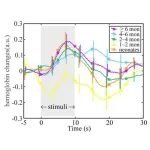(Press-News.org) Mindfulness-Oriented Recovery Enhancement (MORE) — a behavioral intervention that integrates training in mindfulness, emotion regulation strategies and savoring of natural rewards — could hold the key to mitigating relapse in women undergoing medically assisted opioid use disorder treatment, a Rutgers study found.
The pilot study published in the journal Explore, is the first to evaluate the potential neural changes that underlie women’s emotion regulation and craving after an eight-week MORE intervention.
Previous studies have shown that women report higher opioid craving and show a greater inability to control their drug urges than men. Although medications, like buprenorphine, can be effective in mitigating urges in the short-term by limiting biological changes associated with acute withdrawal, it is less effective at long-term adherence in avoiding relapse with other illicit drugs.
“While these medications help with withdrawal, they do not fully engage the core regulatory and affective processing circuits that give people control over negative emotion and do not help to address opioid craving in a sustainable way,” said the lead author Suchismita Ray, an associate professor at Rutgers School of Health Professions. “This is where complementary therapies, such as MORE, could play a key role.”
MORE, which was developed by Eric L. Garland at The University of Utah, is centered on three key therapeutic processes:
Mindfulness, which trains a person to become aware of when their attention has become fixated on addictive cues, stressors or pain, then to shift from affective to sensory processing of craving, stress or pain sensations and re-orient their attention through mindful breathing.
Reappraisal of thoughts to disengage from negative emotions and addictive behaviors and turn toward positive thoughts that promote resilience, meaning and active coping behaviors.
Savoring naturally rewarding experiences (nature, time with a loved one) in a mindful way and recognize the positive emotional responses to the experience.
Researchers studied nine women in residential treatment who were on medications for opioid use disorder and completed an eight-week MORE intervention once a week for two hours. Both before and after the eight-week period, researchers gave participants an emotion regulation questionnaire and then scanned their brains in a magnetic resonance imaging machine while they listening to a 10-minute guided MORE meditation and viewed a picture of an outdoor garden to measure the brain’s communication during the meditation.
“Prior studies have shown that the inability to handle negative emotion and drug craving are major determinants of drug relapse. We examined the immediate effects of the 10-minute guided MORE meditation on mood and craving, then looked at the effects of the eight-week MORE intervention on brain communication and how well the women regulated their emotions,” Ray said. “The results show that a single 10-minute guided MORE meditation without any prior meditation experience immediately improved participants’ mood. The eight-week MORE intervention boosted their emotional awareness and strengthened their impulse control — factors that are important in preventing relapse.”
In addition, researchers found that the eight-week MORE intervention resulted in significantly increased communication between the areas of the brain that may help women with opioid use disorder to better control their negative emotion and drug craving.
“What this could mean is if an opioid user experiences stress or a craving for an opioid, she can immediately practice a 10-minute MORE meditation, which will improve her mood in the moment and potentially prevent her from taking the drug,” Ray said. “If that person also takes part in the eight-week MORE intervention, she could reap additional long-term benefits to control negative emotion and opioid craving and better maintain sobriety.”
Other Rutgers authors include Jamil Bhanji and Mauricio Delgado (Rutgers–Newark) and Patricia Dooley Budsock and Nina A. Cooperman (Rutgers Robert Wood Johnson Medical School). Eric L. Garland from The University of Utah is also an author on this pilot study.
The authors would like to acknowledge The Rutgers University Brain Imaging Center in Newark where the subject scanning took place for this pilot study.
END
Mindfulness could help women with opioid use disorder better control drug urges
A Rutgers pilot study sheds light on how mindfulness could prevent relapse in opioid-dependent women
2023-12-09
ELSE PRESS RELEASES FROM THIS DATE:
TTUHSC’s ARPA-H membership will spur innovation, improve access for West Texas patients
2023-12-09
Imagine if scientists developed a customizable cancer vaccine that was available — and affordable — for everyone. What if a patient scheduled for surgery also had the option of taking a pill whose composition includes nanorobotics capable of performing the procedure?
These and other medical scenarios may seem far-fetched and better suited to a science fiction thriller. However, the Advanced Research Projects Agency for Health (ARPA-H) is seeking to take such ideas from the drawing board to ...
Global annual finance flows of $7 trillion fueling climate, biodiversity, and land degradation crises
2023-12-09
Almost US$7 trillion per year in government subsidies and private investment - around 7 per cent of global GDP - has a direct negative impact on nature.
Nature-based solutions remain dramatically underfunded. Current public and private finance flows are only US$200 billion per year. To meet climate, biodiversity, and restoration targets, this needs to triple by 2030 and quadruple by 2050.
Realignment of public and private nature-negative finance flows is urgently needed
Dubai, 9 December 2022 – Close to $7 trillion is invested globally each year in activities that have a direct negative impact on nature from both public and private sector sources - equivalent to ...
Tracing how the infant brain responds to touch with near-infrared spectroscopy
2023-12-09
Tokyo, Japan – Researchers from Tokyo Metropolitan University have measured how oxygenated hemoglobin levels in the blood change in infants’ brains in response to touch. Using spectroscopy methods with external sensors placed on the scalp of sleeping infants, they found that the time at which levels peak doesn’t change with infant age, but the amount by which it varies over time does. Insights like this shed light on how the physiology of infants develop.
The first phase of a newborn’s life is a dazzling array of rapid developmental ...
These are the world's most effective charities
2023-12-09
Which charities will be most effective in ensuring your donation is put to good use? For the first time in the Netherlands, researchers applied scientific methods to pinpoint which charities achieve the most with the donations they receive. The University of Amsterdam and Stichting Doneer Effectief (Donate Effectively Foundation) unveiled the list on Friday, 8 December, during a sold out evening in Rotterdam. ‘We are talking about the Champions League of good causes,’ says professor of Philanthropy & Sustainable Investment Paul Smeets of the University of Amsterdam. The ranking ...
When is an aurora not an aurora?
2023-12-08
The shimmering green, red and purple curtains of the northern and southern lights — the auroras — may be the best-known phenomena lighting up the nighttime sky, but the most mysterious are the mauve and white streaks called Steve and their frequent companion, a glowing green "picket fence."
First recognized in 2018 as distinct from the common auroras, Steve — a tongue-in-cheek reference to the benign name given a scary hedge in a 2006 children's movie — and its associated picket fence were nevertheless thought to be caused by the same physical processes. But scientists were left scratching their heads about how these glowing emissions ...
Advisory panel issues field-defining recommendations for US government investments in particle physics research
2023-12-08
The High Energy Physics Advisory Panel (HEPAP) to the High Energy Physics program of the Office of Science of the U.S. Department of Energy and the National Science Foundation’s Division of Physics has released a new Particle Physics Project Prioritization Panel (P5) report, which outlines particle physicists’ recommendations for research priorities in a field whose projects — such as building new accelerator facilities — can take years or decades, contributions from thousands of scientists, and billions of dollars.
The 2023 P5 report represents the major activity in the field of particle physics that ...
Doctors discover many patients at UNC’s Inflammatory Bowel Disease Clinic screen positive for malnutrition
2023-12-08
CHAPEL HILL, NC — Eating food and absorbing its nutrients is an everyday occurrence, but this normal activity can look different for someone who suffers from inflammatory bowel disease. IBD, which includes Crohn’s disease and ulcerative colitis, can cause chronic inflammation of the digestive tract – which for many reasons can lead to malnutrition. This malnourished state is associated with an increased risk of morbidity and mortality, and new findings show that many patients in IBD clinic screen positive for malnutrition, leading to the critical need for same-day ...
BNL: Advisory panel issues field-defining recommendations for U.S. government investments in particle physics research
2023-12-08
The following news release on the 2023 Particle Physics Project Prioritization Panel (P5) report is based on one issued today by the American Physical Society (APS) with added content specific to the U.S. Department of Energy’s (DOE) Brookhaven National Laboratory. For more information about Brookhaven Lab’s research in particle physics, contact: Karen McNulty Walsh, kmcnulty@bnl.gov, (631) 344-8350. For APS media inquiries, contact Anna Torres, torres@aps.org, (301) 209-3605.
WASHINGTON, ...
International collaboration uses faculty member’s research on ancient Roman migration, seeks to understand Balkan genomic history
2023-12-08
STARKVILLE, Miss.––A Mississippi State University anthropologist’s bioarchaeological analysis and bone samples from ancient Roman burial sites were crucial in the development of new research regarding Roman and Balkan migration featured this week in Cell, a prestigious peer-reviewed journal.
Anna Osterholtz, an associate professor in the Department of Anthropology and Middle Eastern Cultures, provided her research on the “lived experiences” of the Romans in Croatia. She currently works closely with museum ...
USF Health Heart Institute doctors are upbeat about cardiac regeneration
2023-12-08
But when those batteries – heart muscle cells called cardiomyocytes − short circuit and die, the damage can be devastating. The damage to the heart muscle is usually permanent, leaving the heart unable to pump the way it should.
That’s the subject of a new study by a team that includes two USF Health doctors who reported their findings in Circulation, the flagship journal of the American Heart Association.
“An injury like a heart attack creates a massive loss of cardiomyocytes, and you can’t renew them,’’ said Da-Zhi Wang, PhD, director of the Center for Regenerative Medicine in the USF Health Heart Institute and Morsani College ...
LAST 30 PRESS RELEASES:
The world’s largest brain research prize awarded for groundbreaking discoveries on how we sense touch and pain
Magnetofluids help to overcome challenges in left atrial appendage occlusion
Brain-clearing cells offer clues to slowing Alzheimer’s disease progression
mRNA therapy restores fertility in genetically infertile mice
Cloaked stem cells evade immune rejection in mice, pointing to a potential universal donor cell line
Growth in telemedicine has not improved mental health care access in rural areas, study finds
Pitt scientists engineer “living eye drop” to support corneal healing
Outcomes of older adults with advanced cancer who prefer quality of life vs prolonging survival
Lower music volume levels in fitness class and perceived exercise intensity
Of crocodiles, counting and conferences
AERA announces 2026 award winners in education research
Saving two lives with one fruit drop
Photonic chips advance real-time learning in spiking neural systems
Share of migratory wild animal species with declining populations despite UN treaty protections worsens from 44% to 49% in two years; 24% face extinction, up 2%
One in 20 babies experiences physical abuse, global review finds
Tundra tongue: The science behind a very cold mistake
Targeting a dangerous gut infection
Scientists successfully harvest chickpeas from “moon dirt”
Teen aggression a warning sign for faster aging later in life
Study confirms food fortification is highly cost-effective in fighting hidden hunger across 63 countries
Special issue elevates disease ecology in marine management
A kaleidoscope of cosmic collisions: the new catalogue of gravitational signals from LIGO, Virgo and KAGRA
New catalog more than doubles the number of gravitational-wave detections made by LIGO, Virgo, and KAGRA observatories
Antifibrotic drug shows promise for premature ovarian insufficiency
Altered copper metabolism is a crucial factor in inflammatory bone diseases
Real-time imaging of microplastics in the body improves understanding of health risks
Reconstructing the world’s ant diversity in 3D
UMD entomologist helps bring the world’s ant diversity to life in 3D imagery
ESA’s Mars orbiters watch solar superstorm hit the Red Planet
The secret lives of catalysts: How microscopic networks power reactions
[Press-News.org] Mindfulness could help women with opioid use disorder better control drug urgesA Rutgers pilot study sheds light on how mindfulness could prevent relapse in opioid-dependent women




